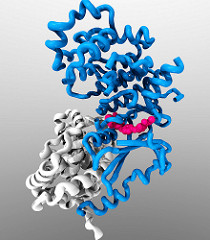Scientists at the University of California, San Diego School of Medicine have discovered that enzymes previously believed to promote cancer actually help suppress tumors. Enzymes are proteins that act as biological catalysts for cellular processes. The group of enzymes studied by the researchers was Protein Kinase C (PKC), which controls functions like cell survival, division, and migration. The fact that PKC enzymes are involved in some cancer-related activities and are activated by tumor-producing compounds led to the widespread, but mistaken, notion that PKC activation causes increased tumor production.
Image Source: Science Photo Library – MOREDUN ANIMAL HEALTH LTD
Corina Antal, a graduate student at UC San Diego and the first author of the study, helped clear up this misconception by using live cell imaging to categorize 8% of the over 550 PKC mutations present in cancers. This characterization revealed that most of the mutations in the PKC gene reduced PKC function. In a mouse model, tumor growth decreased after a PKC mutation was corrected, indicating that normally functioning PKC enzymes inhibit tumor growth rather than promoting it.
Inhibiting PKC has so far proved not only an unsuccessful strategy in a number of cancer clinical trials, but its addition to chemotherapy has resulted in decreased response rates in patients. Given our results, this isn’t surprising. Our findings suggest therapeutic strategies need to go the other way and target ways to restore PKC activity, not inhibit it. This is contrary to the current dogma.
-Alexandra Newton, PhD, principal investigator
The results of this study suggest that future cancer treatments should focus on restoring the activity of the PKC enzymes instead of trying to inhibit them.
Feature Image Source: Cdk8/Cyclin C: inactive conformation by Enzymlogic










